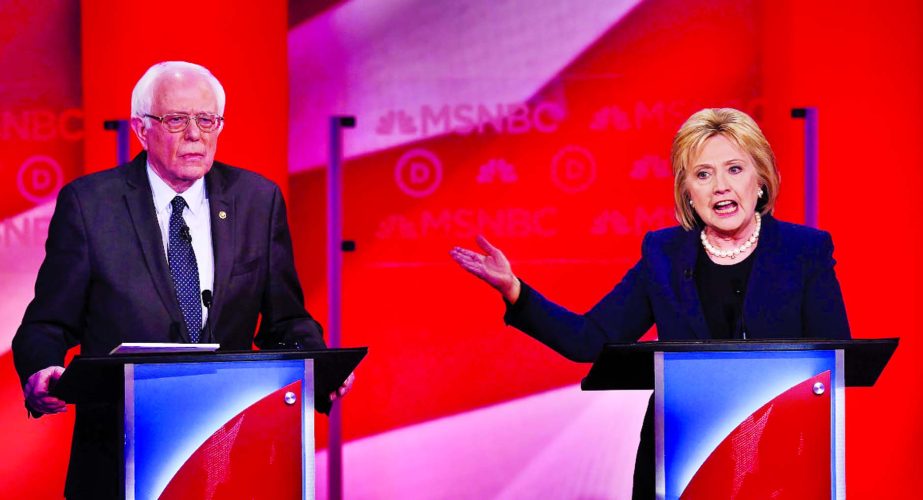
Politico :Hillary Clinton pounced on Bernie Sanders’ foreign policy credentials in Thursday’s Democratic debate, saying the Vermont senator was flunking “a big part of the job interview” for the presidency.In an echo of her 2008 campaign attacks on then-candidate Barack Obama-whom Clinton called unready for a proverbial “3 a.m. phone call” at the White House-the former secretary of state questioned whether Sanders could handle a global crisis as president.”When New Hampshire voters go on Tuesday to cast your vote, you are voting both for a president and a commander in chief,” Clinton said. “And there is no way to predict what comes in the door of that White House from day to day that can pose a threat to the United States or one of our friends and allies, and I think this is a big part of the job interview that we are all conducting with the voters here,” Clinton said.And much as Obama did eight years ago, Sanders shifted the question about experience to one of judgment.I fully concede that Secretary Clinton, who was secretary of state for four years, has more experience… in foreign affairs,” Sanders retorted. “But experience is not the only point-judgment is. And once again, back in 2002, when we both looked at the same evidence about the wisdom of the war in Iraq, one of us voted the right way and one of us didn’t.” In 2008, the experience versus judgment debate ended badly for Clinton, whose vote to authorize military force against Iraq may have cost her the Democratic nomination. In New Hampshire on Thursday, Clinton cast that Bush-era episode as a distraction.”We did differ,” Clinton said. “A vote in 2002 is not a plan to defeat ISIS. We have to look at the threats that we face right now.” The subject of foreign policy expertise was introduced by MSNBC debate moderator Chuck Todd, who told Sanders that “nobody knows who your foreign policy advisers are. You haven’t given a major foreign policy speech.” POLITICO reported last week on confusion about where Sanders gets his foreign policy advice.In another echo of Clinton’s 2008 battle with Obama, Sanders invoked one of his rival’s memorable attacks from that primary. “When you ran against Senator Obama you thought him naive because he thought it was a good idea to talk to our enemies,” said Sanders, whom Clinton has criticized for saying the U.S. should move quickly to “normalize relations” with Iran. “I think those are exactly the people you have to talk to and you have to negotiate with.”Clinton did call Obama naive after a 2007 primary debate in which he said, in response to a question from a voter, that he would be willing to meet with the leaders of Iran, North Korea and Cuba “without preconditions.” It was the latter clause that Clinton-who even at that time supported trying nuclear diplomacy with Iran-seized upon, a point she sought to clarify Thursday night.”Let me correct the record,” Clinton said. “As I certainly recall, the question was to meet with conditions. And you’re right, I was against that. I was against it then, I would be against it now.”Clinton’s camp has ridiculed Sanders in recent weeks for comments that could be interpreted as suggesting that Saudi Arabia and Iran-who are mortal enemies-ally against the Islamic State. “Of course they hate each other,” Sanders clarified on Thursday. And he spoke in detail about Syria and Iraq, calling for a Muslim ground force supported by U.S. equipment and air power. Top moment from the MSNBC democratic debate.But Sanders-who does not serve on any Senate committee dealing with foreign affairs, the military or intelligence-was less at ease discussing other regions.Asked twice on how long the U.S. should leave troops in Afghanistan, for instance, Sanders quickly changed the subject to Iraq each time. “You can’t simply withdraw tomorrow-I wish we could-and allow, you know, the Taliban or anybody else to reclaim that country,” he said after Todd repeated his Afghanistan question. “But what we must do, and what we have seen in recent months, is some progress in Iraq,” Sanders added, staying on the latter topic.Asked by Todd why he had not yet laid out a “foreign policy doctrine,” Sanders cited a November speech he delivered on the subject of democratic socialism, which also discussed foreign policy.That speech called for a new NATO-like organization to take on modern security threats like terrorism. Sanders also insisted that “wealthy and powerful Muslim nations … can no longer sit on the sidelines and expect the United States to do their work for them.” For her part, Clinton reiterated her past vow that she would not commit a large ground force to Iraq or Syria, adding “I think we’re making some progress” in the conflict against ISIS.Sanders vowed “that our great task is to make certain that our young men and women in the military do not get sucked into never-ending, perpetual warfare within the quagmire of Syria and Iraq.” And he boasted that his 2002 floor speech opposing the Iraq war resolution had foreseen what was to come in the Middle East. “It gives me no pleasure to tell you that much of what I feared would happen the day after Saddam Hussein was overthrown, in fact, did happen,” Sanders said.That speech was prescient in some ways. At the time, the Vermont socialist warned that “a war and a long-term American occupation of Iraq could be extremely expensive.” “Who will govern Iraq when Saddam Hussein is removed,” Sanders asked, “and what role will the U.S. play in ensuing a civil war that could develop in that country?” Barack Obama asked similar questions at the time-ones he often invoked during his 2008 battle with Clinton.

